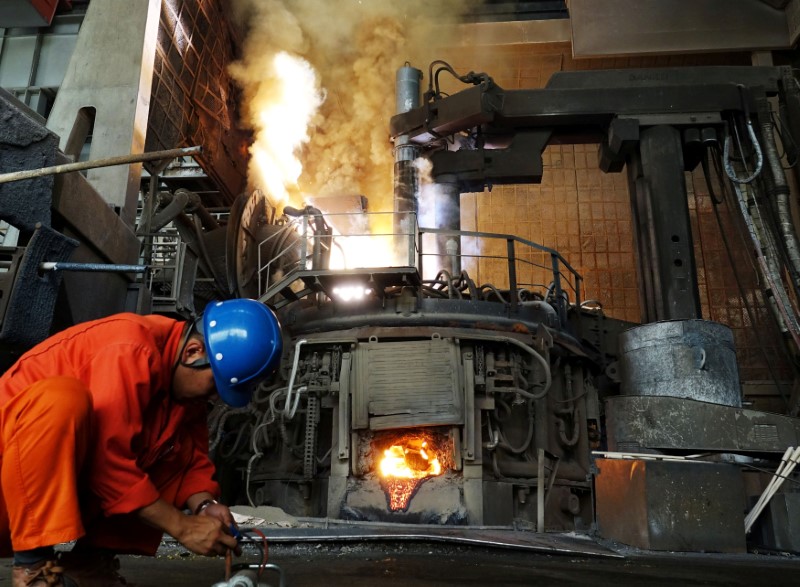By Manolo Serapio Jr and Muyu Xu
MANILA/BEIJING (Reuters) - Chinese steel producers ran up losses for the first time in three years this month as prices slid into a bear market on weak demand and near-record supply, ending years of solid profit margins.
And with the world's No. 2 economy cooling and facing increased risks from a growing trade war with the United States, China's steelmakers are likely to feel more pain unless Beijing launches fresh stimulus measures, traders and analysts say.
Amid tumbling prices, Chinese mills - which make half the world's steel - are reining in costs by returning to cheaper, low-grade raw material iron ore, in a boon for miners like Australia's Fortescue Metals Group (AX:FMG).
China's steel production hit a record 82.55 million tonnes in October, but steel prices and margins have since shrunk as China dialled back on winter output curbs aimed at cutting smog, while demand weakened as cold weather slows the construction sector.
"Fat margins were caused by firm demand and tight supply, which is unsustainable in the long term," said CRU analyst Richard Lu. "This decline is not temporary but the start of a downward trend."
China's steel producers had been in party mode since 2016 when prices doubled as a strong infrastructure push boosted demand, and supply tightened as the country's tough anti-pollution campaign disrupted production.
Beijing also removed 140 million tonnes of low-end steel capacity in 2017, equal to about 17 percent of that year's total output.
Profit margins surged to a record 1,706 yuan ($246) a tonne for rebar and 1,326 yuan for hot rolled coil in December 2017 and have stayed high this year, pushing mills to ramp up output.
But as demand began to falter this month, mills were left with surplus steel, compounded by more lenient production curbs this winter as China allowed regions to set their own output restrictions based on emission levels.
The price of China's rebar - used in construction - has fallen 21 percent to a low of 3,496 yuan a tonne on Monday from a seven-year peak reached in August, putting it in a technical bear market. [IRONORE/]
Profit margins fell. Rebar producers in top steelmaking city Tangshan saw margins narrow to 297 yuan a tonne on Monday from 889 yuan at end-October, according to data tracked by Jinrui Futures.
Makers of hot rolled coil (HRC) - used in manufacturing - incurred a loss this month for the first time since November 2015, Jinrui Futures said, estimating it at 130 yuan ($18.75) a tonne on Nov. 21.
Tivlon Technologies, a Singapore-based steel and iron ore data analytics company, expects Chinese HRC producers to realise a loss of 150 yuan per tonne in the second half of November compared with a loss of 200 yuan in the first half. Most rebar producers are at breakeven, according to Tivlon.
HIGH-GRADE ORE PREMIUM DROPS
Anticipating further steel price declines, traders who typically replenish over winter ahead of a pickup in demand by spring are shunning restocking, pulling inventories to the lowest this year.
"The risk of hoarding physical steel products right now is too high," said a rebar trader from China's northern Liaoning province who gave his surname as Wang. "The market generally believes prices will not stop falling unless steel mills voluntarily cut output."
Amid weaker steel prices, the average utilisation rate at Chinese mills dropped to 67.54 percent last week after rising for three straight weeks, data compiled by Mysteel consultancy showed.
Mills which had previously favoured high quality iron ore to achieve maximum output with lowest emissions are also reining in costs by using more lower grade material with iron content below 60 percent.
The shift is benefiting miners like Fortescue, which have been marked down against high-grade producers like Brazil's Vale (SA:VALE3).
"We have seen increased demand recently with mills procuring more 58 percent material in response to declining steel margins," Fortescue Chief Executive Elizabeth Gaines told Reuters by email.
The price of 65-percent grade iron ore for delivery to China
That cut the premium for high-grade to $44.50, the smallest since March. In July, the premium hit a record $54.70 as China's bid for clearer skies increased preference for higher quality ore.
"If the margins continue to drop, more mills will use low-grade iron ore," said a senior manager at a mill in southern China that produces both rebar and HRC.

($1 = 6.9397 Chinese yuan)